Sally M. Benson
Accelerating Carbon Capture and Storage Modeling using Fourier Neural Operators
Oct 31, 2022Abstract:Carbon capture and storage (CCS) is an important strategy for reducing carbon dioxide emissions and mitigating climate change. We consider the storage aspect of CCS, which involves injecting carbon dioxide into underground reservoirs. This requires accurate and high-resolution predictions of carbon dioxide plume migration and reservoir pressure buildup. However, such modeling is challenging at scale due to the high computational costs of existing numerical methods. We introduce a novel machine learning approach for four-dimensional spatial-temporal modeling, which speeds up predictions nearly 700,000 times compared to existing methods. It provides highly accurate predictions under diverse reservoir conditions, geological heterogeneity, and injection schemes. Our framework, Nested Fourier Neural Operator (FNO), learns the solution operator for the family of partial differential equations governing the carbon dioxide-water multiphase flow. It uses a hierarchy of FNO models to produce outputs at different refinement levels. Thus, our approach enables unprecedented real-time high-resolution modeling for carbon dioxide storage.
U-FNO -- an enhanced Fourier neural operator based-deep learning model for multiphase flow
Sep 17, 2021



Abstract:Numerical simulation of multiphase flow in porous media is essential for many geoscience applications. Data-driven machine learning methods provide faster alternatives to traditional simulators by training neural network models with numerical simulation data mappings. Here we present U-FNO, a novel neural network architecture for solving multiphase flow problems with superior speed, accuracy, and data efficiency. U-FNO is designed based on the newly proposed Fourier neural operator (FNO) that learns an infinite-dimensional integral kernel in the Fourier space, which has shown excellent performance for single-phase flows. Here we extend the FNO-based architecture to a CO2-water multiphase problem, and proposes the U-FNO architecture to enhance the prediction accuracy in multiphase flow systems. Through a systematic comparison among a CNN benchmark and three types of FNO variations, we show that the U-FNO architecture has the advantages of both the traditional CNN and original FNO, providing significantly more accurate and efficient performance than previous architectures. The trained U-FNO predicts gas saturation and pressure buildup with a 6*10e4 times speed-up compared to traditional numerical simulators while maintaining similar accuracy. The trained models can act as a general-purpose simulator alternative for 2D-radial CO2 injection problems with wide ranges of permeability and porosity heterogeneity, anisotropy, reservoir conditions, injection configurations, flow rates, and multiphase flow properties.
CCSNet: a deep learning modeling suite for CO$_2$ storage
Apr 05, 2021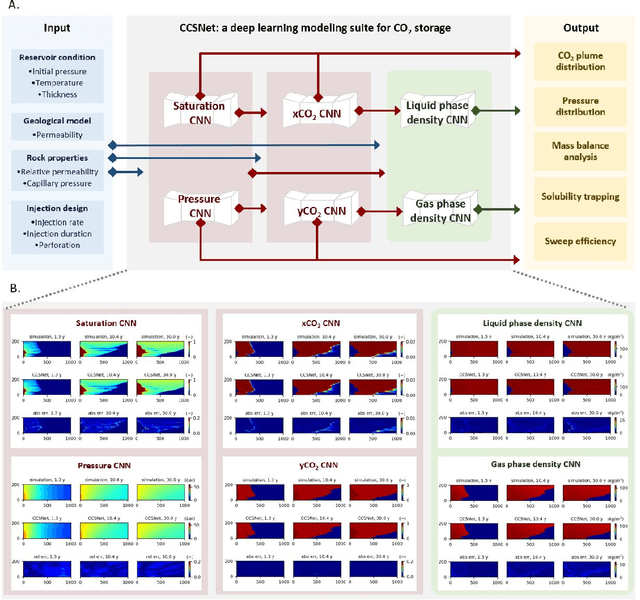
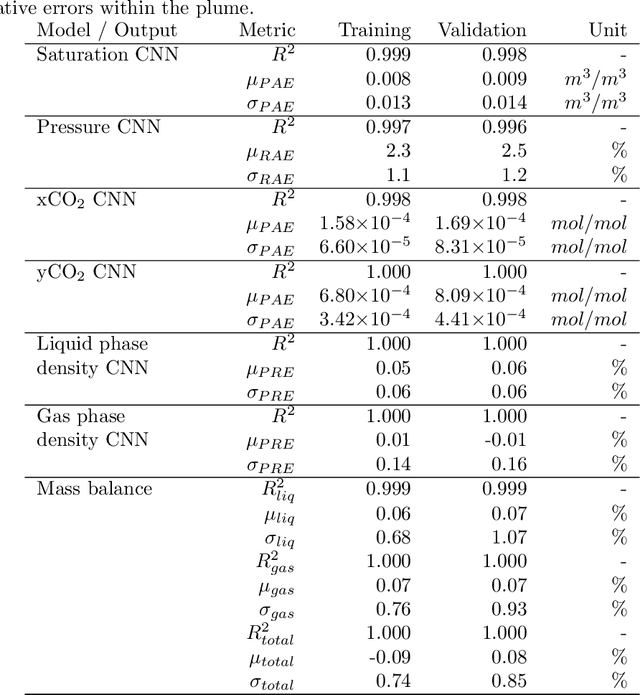
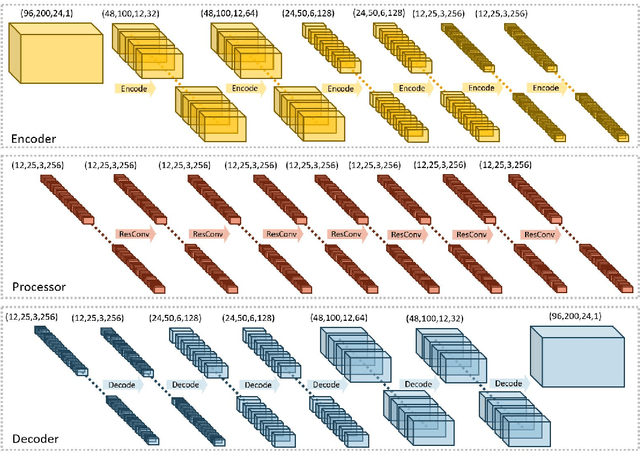
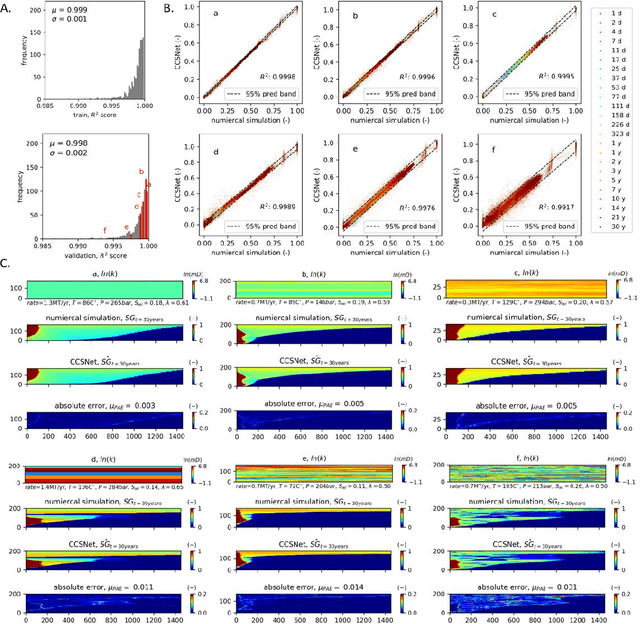
Abstract:Numerical simulation is an essential tool for many applications involving subsurface flow and transport, yet often suffers from computational challenges due to the multi-physics nature, highly non-linear governing equations, inherent parameter uncertainties, and the need for high spatial resolutions to capture multi-scale heterogeneity. We developed CCSNet, a general-purpose deep-learning modeling suite that can act as an alternative to conventional numerical simulators for carbon capture and storage (CCS) problems where CO$_2$ is injected into saline aquifers in 2d-radial systems. CCSNet consists of a sequence of deep learning models producing all the outputs that a numerical simulator typically provides, including saturation distributions, pressure buildup, dry-out, fluid densities, mass balance, solubility trapping, and sweep efficiency. The results are 10$^3$ to 10$^4$ times faster than conventional numerical simulators. As an application of CCSNet illustrating the value of its high computational efficiency, we developed rigorous estimation techniques for the sweep efficiency and solubility trapping.
Multiphase flow prediction with deep neural networks
Oct 21, 2019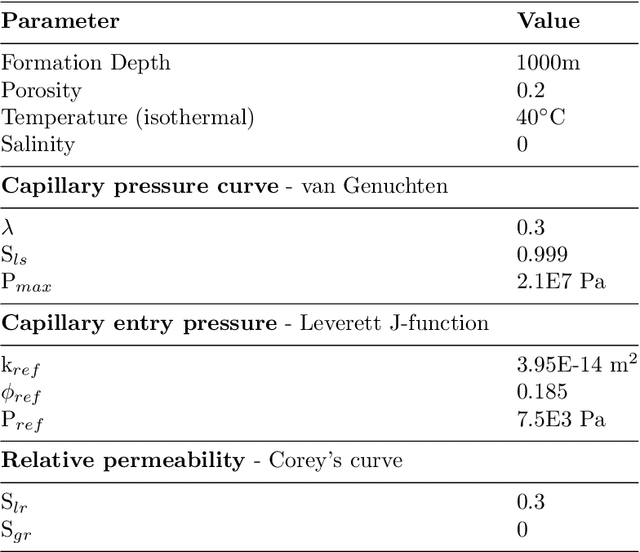
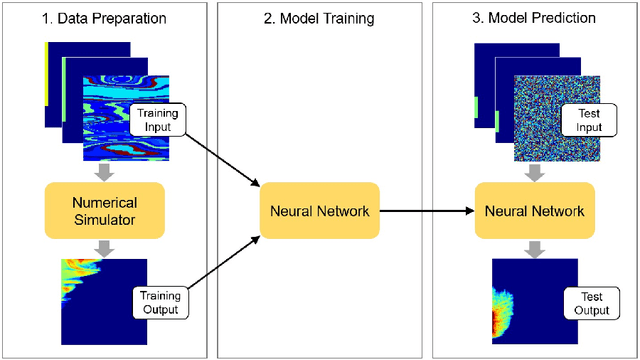


Abstract:This paper proposes a deep neural network approach for predicting multiphase flow in heterogeneous domains with high computational efficiency. The deep neural network model is able to handle permeability heterogeneity in high dimensional systems, and can learn the interplay of viscous, gravity, and capillary forces from small data sets. Using the example of carbon dioxide (CO2) storage, we demonstrate that the model can generate highly accurate predictions of a CO2 saturation distribution given a permeability field, injection duration, injection rate, and injection location. The trained neural network model has an excellent ability to interpolate and to a limited extent, the ability to extrapolate beyond the training data ranges. To improve the prediction accuracy when the neural network model needs to extrapolate, we propose a transfer learning (fine-tuning) procedure that can quickly teach the neural network model new information without going through massive data collection and retraining. Based on this trained neural network model, a web-based tool is provided that allows users to perform CO2-water multiphase flow calculations online. With the tools provided in this paper, the deep neural network approach can provide a computationally efficient substitute for repetitive forward multiphase flow simulations, which can be adopted to the context of history matching and uncertainty quantification.
 Add to Chrome
Add to Chrome Add to Firefox
Add to Firefox Add to Edge
Add to Edge